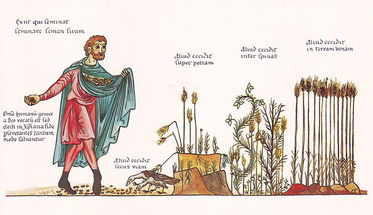 Matthew 13:1-9 Jesus said, ‘Imagine a sower going out to sow… some seeds fell on rich soil and produced their crop, some a hundredfold, some sixty, some thirty.’ The place where I grew up, much like Houghton Regis, used to depend heavily on agriculture (and then also factories) for its economic wellbeing. Late in autumn farmers went out to sow the seeds for the next year’s crops of wheat and corn in straight, well-spaced rows that covered every fertile bit of ground. But at no point in time I saw any farmer going out to scatter seeds in the haphazard way described by in today’s gospel. Who in their right mind would sow seed on the edge of a path, or among thorns, or on rocky soil? And why would anyone waste precious seed on four types of soil, when only one of them will produce sure returns, sure crops? But the parable is not there to be taken literally. It is here to illustrate God’s generosity beyond measure and his abundant love for us, and to make us reflect on how we respond to this love. As we have read, the farmer sows his seed far and wide regardless of his returns, so God sows his word among us, regardless of how we are going to commit to him. With God there is no strategic deployment of resources only for those who might go on to be saints; everyone is invited to receive the message of gospel, and then to freely commit to Christ according to their means and desires. Then the parable illustrates through its use of language borrowed from agriculture, a language that was once common to most people, how most people fall in four categories when it comes to living the Christian life. And through this explanation Jesus invites each one of us to ask ourselves: how do I receive the Word of God? As we read, there are people who don’t understand the word of the Kingdom of God, those who do not get the point of religion, and so evil steals away what was sown in their hearts. We can hope we are not in this group, but we might be, especially when we are prevented to commit to faith because of the evil circumstances that we sometimes witness; “How can God allow that?” or “Why has this happened to me?” we might ask, and in doing so we put up obstacles for God to reach us; and, as it were, we make the soil of our hearts hard and inhospitable. The second group are those who hear the word and receive it immediately with joy but when difficulties come, these people immediately fall away. Hopefully we are not like that either. Then there are people who hear the word but then anxieties of daily life take up all the room leaving no space for God and the lure of a comfortable life choke the word so that it ends up bearing no fruit. We might be like that but we can hope not. We want to be like the last group of people mentioned by Jesus: the people who hear the word, understand it in their hearts, and committing to religion, bears fruit! However, the reality is that probably we belong to each of those various groups at various times. Jesus is not telling us a parable to condemn us or to shame us but to invite us to change our ways of living so that we can be more consistently in that last group. Wherever each of us finds themselves right now, Jesus is gently inviting us to do better, to improve the soil of our hearts – for want of better words – to deepen our commitment to him, and so going on to produce a plentiful harvest of good works.
0 Comments
Your comment will be posted after it is approved.
Leave a Reply. |
Archives
June 2020
Categories
All
|
 RSS Feed
RSS Feed


